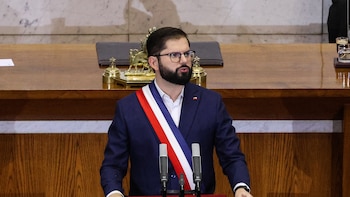UNITED NATIONS (AP) — France and Mexico pressure UN members to mention the Russian invasion in a resolution on the deteriorating humanitarian situation in Ukraine. But South Africa has taken a stand against it, and assures that inserting political issues could hamper consensus to help civilians.
The resolution drawn up jointly by France and Mexico is scheduled to be voted on this week at the UN General Assembly. The proposal reiterates the demand of the world body made on 2 March that Russia end its military offensive in Ukraine and withdraw all its troops. It also requires the protection of all civilians and the infrastructure essential for their survival.
The draft, which The Associated Press had access to on Monday, assures that the “serious humanitarian consequences” of the Russian aggression in Ukraine “are of a magnitude that the international community has not seen in Europe for several decades.” It condemns the air and artillery attacks by Russian forces and the siege of densely populated cities, in particular the port of Mariupol, in southern Ukraine.
A draft resolution prepared by South Africa circulated on Monday and the PA also gained access to the document, which makes no mention of Russia. Instead, it calls for an “immediate cessation of hostilities” as a first step to mitigate the humanitarian situation, refers to “all parties” and encourages “political dialogue, negotiations, mediation and other peaceful means with the aim of achieving a lasting peace”.
The South African motion for a resolution would recognize “the autonomy of humanitarian objectives from political, economic, military or other objectives that either party might have in areas where humanitarian action is implemented”. It would also require the protection of civilians and the infrastructure essential for their survival and “critical civilian infrastructure to facilitate the delivery of essential services in armed conflict”.
France and Mexico decided to bring the humanitarian resolution to the General Assembly after negotiating a similar proposal that mentioned the two-week Russian invasion of Ukraine in the Security Council, where Russia made it clear that it would veto the measure.
Unlike the Security Council, there are no vetoes in the General Assembly. But resolutions in the 193-nation Assembly are not binding, as are those of the Security Council, although they do reflect the views of the international community.
Supporters of the Franco-Mexican resolution hope to achieve a vote similar to that of the General Assembly resolution of March 2, which demanded an immediate cessation of Russian military actions and the withdrawal of all its troops. That vote was 141-5, with 35 abstentions, and was described by its promoters as an example of Russia's isolation.
South Africa was one of the 35 countries that abstained from voting on that resolution.
Explaining the context of its proposal on Monday, South Africa indicated that the measure should express concern about the humanitarian situation in Ukraine and call on all parties to adhere to international humanitarian law, which prohibits attacks on civilians and civilian infrastructure, such as hospitals, schools and water facilities. He also noted that “political problems that may lead Member States not to agree on a text should be addressed elsewhere”.
The proposal of France and Mexico begins by reiterating the first words of the Charter of the United Nations and would reaffirm the determination of the General Assembly to “save subsequent generations from the scourge of war”.
It would also reiterate the Charter's obligations that all UN member nations should refrain from the threat or use of force against “the territorial integrity or political independence of any State”.
Both the proposal by Mexico and France and that of South Africa would reaffirm the Assembly's commitment to “the sovereignty, independence, unity and territorial integrity of Ukraine”.
Últimas Noticias
Debanhi Escobar: they secured the motel where she was found lifeless in a cistern
Members of the Specialized Prosecutor's Office in Nuevo León secured the Nueva Castilla Motel as part of the investigations into the case

The oldest person in the world died at the age of 119
Kane Tanaka lived in Japan. She was born six months earlier than George Orwell, the same year that the Wright brothers first flew, and Marie Curie became the first woman to win a Nobel Prize

Macabre find in CDMX: they left a body bagged and tied in a taxi
The body was left in the back seats of the car. It was covered with black bags and tied with industrial tape
The eagles of America will face Manchester City in a duel of legends. Here are the details
The top Mexican football champion will play a match with Pep Guardiola's squad in the Lone Star Cup

Why is it good to bring dogs out to know the world when they are puppies
A so-called protection against the spread of diseases threatens the integral development of dogs




